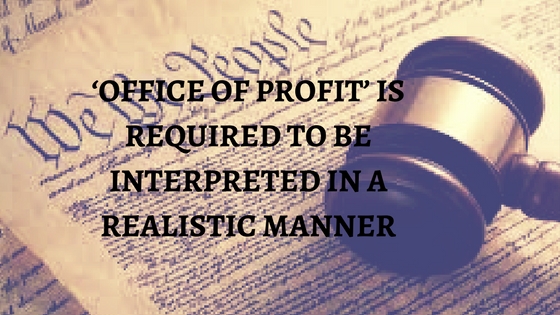Aapka Consultant Judgment Series- In this series, we are providing case analysis of Landmark Judgments of Hon’ble Supreme Court of India.
Jaya Bachchan vs. Union of India (UOI) and Ors.
AIR2006SC2119, 2006)5SCC266, 2006(5)SCALE511
Hon’ble Judges/Coram: Y.K. Sabharwal, C.J., C.K. Thakker and R.V. Raveendran, JJ.
Date of Decision: 08.05.2006
FACTS:-
The challenge in this petition filed under Article 32 of the Constitution of India, is to the order of the Hon’ble President of India, dated 16th March, 2006, whereby, in exercise of powers conferred under Clause (1) of Article 103 of the Constitution of India, the Hon’ble President has decided, after obtaining the opinion of the Election Commission as required by Article 103(2), that the petitioner stands disqualified for being a Member of the Rajya Sabha on and from 14th day of July, 2004. The challenge is also to the opinion dated 2nd March, 2006 rendered by the Election Commission to the Hon’ble President, under Clause (2) of Article 103, that the petitioner became disqualified under Article 102(1)(a) of the Constitution for being a Member of the Rajya Sabha on and from 14th July, 2004 on her appointment by the Government of Uttar Pradesh as Chairperson of the U.P. Film Development Council.
The Election Commission, after referring to the facts and the law enunciated by this Court in several decisions, has expressed the opinion that the office of Chairperson of the Council to which the petitioner was appointed by the State Government by O.M. dated 14.7.2004, on the terms and conditions specified therein, is an “office of profit” under the Government of Uttar Pradesh for purposes of Article 102(1)(a) of the Constitution. The Commission also found that Section 3 of the Parliament (Prevention of Disqualification) Act, 1959 did not exempt the said office of profit from disqualification under Article 102(1)(a) of the Constitution.
ISSUE:-
Whether a Rajya Sabha MP become disqualified under Article 102(1)(a) of the Constitution after being appointment by the State Government of Uttar Pradesh as Chairperson of the U.P. Film Development Council which is contended to be an ‘office of profit’?
JUDGMENT:-
The Court in this case analysed various Supreme Court judgments which were relied upon by the petitioner and held them to be distinguishable on facts and thus not applicable on the petitioner’s case. In line with it, the Court said that Clause (1)(a) of Article 102 provides that a person shall be disqualified for being chosen as, and for being, a member of either House of Parliament if he holds any office of profit under the Government of India or the Government of any State, other than an office declared by Parliament by law not to disqualify its holder. The term ‘holds an office of profit’ though not defined, has been the subject matter of interpretation, in several decisions of this Court.
An office of profit is an office which is capable of yielding a profit or pecuniary gain. Holding an office under the Central or State Government, to which some pay, salary, emolument, remuneration or non-compensatory allowance is attached, is ‘holding an office of profit’. The question whether a person holds an office of profit is required to be interpreted in a realistic manner. Nature of the payment must be considered as a matter of substance rather than of form. Nomenclature is not important. In fact, mere use of the word ‘honorarium’ cannot take the payment out of the purview of profit, if there is pecuniary gain for the recipient. Payment of honorarium, in addition to daily allowances in the nature of compensatory allowances, rent free accommodation and chauffeur driven car at State expense are clearly in the nature of remuneration and a source of pecuniary gain and hence constitute profit. For deciding the question as to whether one is holding an office of profit or not, what is relevant is whether the office is capable of yielding a profit or pecuniary gain and not whether the person actually obtained a monetary gain.
If the “pecuniary gain” is “receivable” in connection with the office then it becomes an office of profit, irrespective of whether such pecuniary gain is actually received or not. If the office carries with it, or entitles the holder to, any pecuniary gain other than reimbursement of out of pocket/actual expenses, then the office will be an office of profit for the purpose of Article 102(1)(a). This position of law stands settled for over half a century commencing from the decisions of Ravanna Subanna v. G.S. Kaggeerappa AIR1954SC653, Shivamurthy Swami Inamdar v. Agadi Sanganna Andanappa (1971)3SCC870, Satrucharla Chandrasekhar Raju v. Vyricherla Pradeep Kumar Dev AIR1992SC1959 and Shibu Soren v. Dayanand Sahay and Ors. [2001] 3 SCR 1020.
With regard to the facts of this case, Court said that the office of Chairperson carried with it a monthly honorarium of Rs. 5000/-, entertainment expenditure of Rs. 10,000/-, staff car with driver, telephones at office and residence, free accommodation and medical treatment facilities to self and family members, apart from other allowances etc. That these are pecuniary gains, cannot be denied. The fact that the petitioner is affluent or was not interested in the benefits/facilities given by the State Government or did not, in fact, receive such benefits till date, are not relevant to the issue.
HELD:-
Court held that where the office carries with it certain emoluments or the order of appointment states that the person appointed is entitled to certain emoluments, then it will be an office of profit, even if the holder of the office chooses not to receive/draw such emoluments. In light of this it was held that the post of chairperson of the U.P. Film Development Council is an ‘office of profit’ and thus the petitioner is liable to be disqualified as the Member of Parliament
To Get Legal Opinion from Advocates/ Legal Experts, Please click here
To Get Legal Opinion from Retired Hon’ble Judges, Please click here












